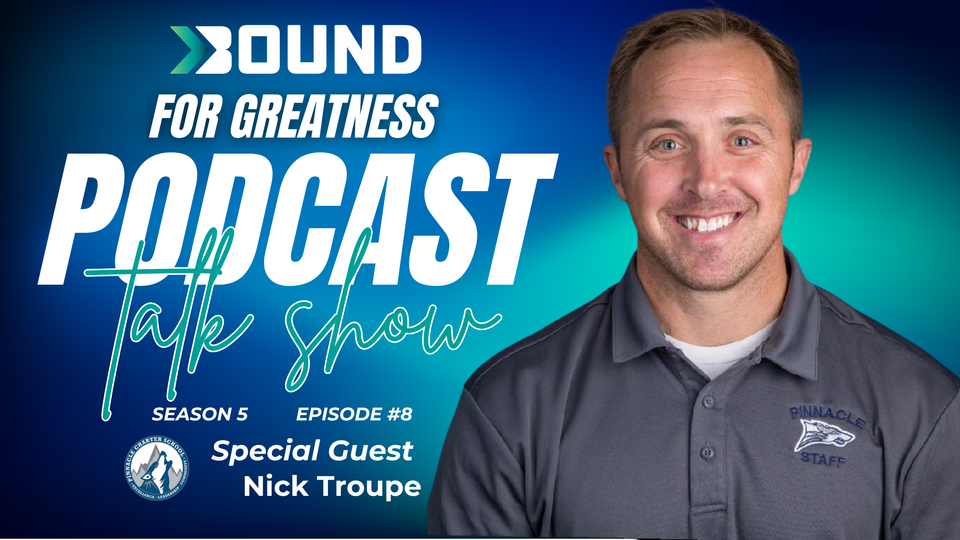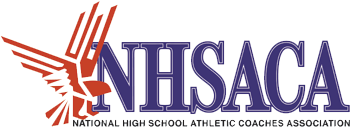One Pack, One Mission: The Blueprint for Rebuilding School Culture

By Scott Garvis C.M.A.A. NHSACA Executive Director of Finance & Partnerships
One Pack, One Mission: How Nic Troupe Rebuilt an Entire Athletic Culture from the Ground Up
When Nic Troupe first walked into Pinnacle Charter School in 2018, he didn’t find an athletic department in need of a few tweaks. He found chaos. Fragmented communication, outdated systems, cultural dysfunction, and a glaring absence of shared purpose—all waiting on his desk in the form of a three-ring binder with six sheets of paper and three keys.
“I didn’t even know where to start,” Troupe recalls. “There was no real structure—middle school against high school, pen-and-paper processes, no digital systems. It was just… broken.”
But six years later, Troupe hasn’t just repaired the system—he’s reimagined it. From fractured and forgotten to unified and intentional, Pinnacle’s athletic program is now a blueprint for transformation. And at the center of it all is a simple mantra: One Pack, One Mission.
This is the story of how a young AD, with no secretary and no playbook, used vision, values, and relentless leadership to bring a program back to life.
A Department Divided
In his first year, Troupe served as the high school athletic director. Even at that limited scope, the problems were impossible to ignore. Disjointed communication. Middle school and high school coaches feuding over facilities. Students leaving the program in droves.
“We were losing kids every year to bigger schools,” Troupe says. “There was no identity. No connection between levels. Everyone was just doing their own thing.”
When he transitioned into the full K–12 AD role, Troupe didn’t just see an opportunity—he saw a necessity.
“I knew we had to unify. We had to become a single program, not just a bunch of disconnected teams.”
His first step? Fix the small things that made everyday life easier. He moved the registration process online, built out Google Forms, and developed tracking systems. That administrative efficiency, though subtle, was the first layer of structure the department had seen in years.
But the real work wasn’t in tech. It was in trust.
Building the Bridge: Coaches, Culture, and Continuity
One of the biggest challenges was bridging the divide between middle school and high school coaches.
“There was no concept of a program,” Troupe says. “Middle school coaches weren’t aligned with what was happening at the high school, and vice versa. We had to create that pipeline.”
Troupe pushed his high school coaches to adopt what he calls a “CEO mentality.” That meant getting involved at the lower levels—running camps, showing up to games, mentoring younger athletes.
“I told them, these are your kids. Not in the future. Now.”
That cultural shift took time—and turnover. Troupe had to make tough calls, replacing coaches who couldn’t or wouldn’t buy in with those who shared the vision.
“It wasn’t easy,” he admits. “But I knew that for us to grow, we needed the right people. Culture always comes down to people.”
Today, many of those people are homegrown.
“Over half of my K–12 coaches are former student-athletes of mine,” he says proudly. “That’s the culture coming full circle.”
Enrollment is Everything
As a charter school in a competitive Denver-area landscape, Pinnacle doesn’t just run sports—it markets them.
“If we don’t have kids, we don’t have programs,” Troupe says. “We’re not a big-name powerhouse. We’re not hanging banner after banner. But we can offer belonging, consistency, and opportunity.”
Troupe understood that sports had to be an enrollment driver. That meant investing in branding, building relationships with families, and creating an experience worth staying for.
“Our kids have real challenges—many of them are working jobs to help their families. I want to give them something worth showing up for.”
He leveraged a full-school rebrand to reset expectations and launched his own internal campaign: One Pack, One Mission.
“It wasn’t just a slogan. It became our compass.”
Setting Standards—And Sticking to Them
Culture change isn’t about catchy hashtags. It’s about consistency. Troupe made it clear that athletic participation came with expectations—on and off the field.
“I suspended kids. I walked fans out of games. I made it known—if you can’t handle the responsibility of representing Pinnacle, you won’t wear the uniform.”
The message was loud, but more importantly, it was consistent. Over time, behavior shifted. Fans came back. Coaches aligned. Officials started talking—not about chaos, but about respect.
“Now when refs come to our gym, they know they’ll be greeted, escorted, fed, and paid on time,” Troupe says. “That wasn’t the case before. The little things matter.”
Today, the results speak for themselves: ejections are down, sportsmanship is up, and Pinnacle athletes are building a reputation as tough, respectful competitors—win or lose.
The Hardest Call: Ending the Familiar to Build the Future
Of all the decisions Troupe has made, none was harder than letting go of Pinnacle’s football coach—a well-liked in-building staff member who shared his vision but couldn’t build the numbers.
“It was personal,” Troupe says. “We came in the same year. I respected him. But we were forfeiting games. Participation was falling off. I fought the change at first, but ultimately, I had to trust the bigger picture.”
It was a gut-wrenching but necessary move. Today, Pinnacle football is growing again—with increased participation and momentum. But the lesson stuck.
“Personnel decisions are the hardest,” he reflects. “They’re about people, not spreadsheets. But if you want to build something lasting, you’ve got to make the hard calls.”
Embracing Who You Are
For Troupe, the turning point came when he stopped trying to mimic other programs and started embracing what made Pinnacle unique.
“We’re not a private school with endless resources. We’re not a suburban powerhouse. And that’s okay.”
Instead, he leaned into Pinnacle’s strengths: a tight-knit community, resilient students, and a staff willing to grow.
“I stopped trying to be that other school. I figured out who we are and made that our advantage.”
That clarity has unlocked new opportunities—from hosting CHSAA events to taking on leadership roles within the state and local leagues.
Advice for Athletic Directors in the Fire
When asked what he’d tell new ADs walking into dysfunctional departments, Troupe doesn’t hesitate.
“Don’t be afraid to blow it up.”
Then, more deliberately: “Figure out what’s working—if anything—and preserve it. But don’t be scared to start over. Sometimes that’s what’s required.”
He emphasizes networking, listening, and learning. He highlights the importance of mission, vision, and values—but insists they must be lived, not laminated.
“You’ve got to model the standard. You’ve got to own the vision. Because if you don’t, nobody else will.”
One Pack, One Legacy
Today, Nick Troupe isn’t just managing an athletic department. He’s leading a movement.
Through structure, vision, and relentless attention to detail, he’s transformed a fractured program into a unified one. He’s built a reputation rooted in discipline, pride, and community. And perhaps most importantly, he’s created a space where students—many of them facing real-life adversity—feel seen, supported, and valued.
Pinnacle may not hang championship banners every season. But thanks to Troupe’s leadership, they’re hanging their heads a little higher.
Because as he tells his coaches, his players, and himself every day:
If you don’t have athletes, you don’t have an athletic program. But if you don’t have a mission, you don’t have a legacy.
And legacies—real, lasting legacies—are always Bound for Greatness.

Member discussion